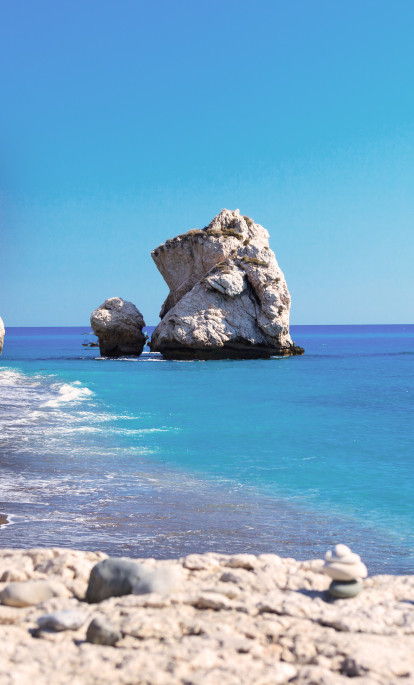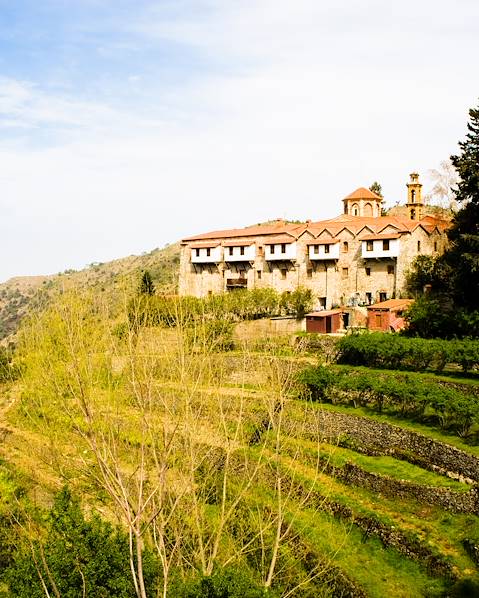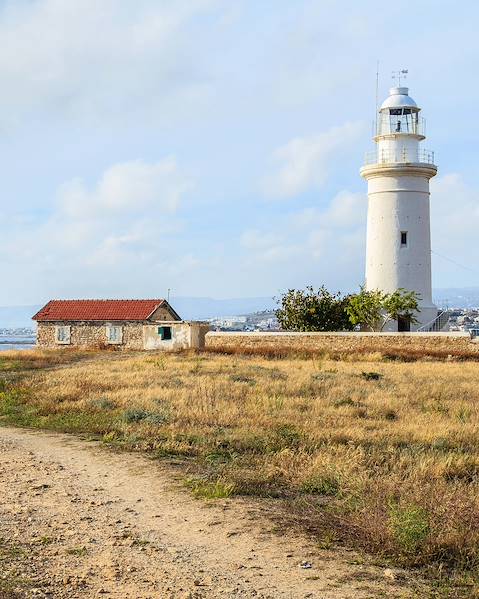Population
1.24 million inhabitants (2021).
Languages Spoken
Greek and Turkish are the two official languages of Cyprus, while Armenian, Cypriot Arabic and Kurbetcha are the three main minority languages. The island is divided into two, with the Cypriot Turks living in the north and Greek Cypriots in the south. Both Greek and Turkish Cypriots have their own distinct dialects, however standard modern Greek and standard Turkish are used for official government business, courts, administration, media and educational institutes of Cyprus within each respective region. The Turkish Cypriot dialect is not as distinct from standard Turkish as Cypriot Greek is from standard Greek. Around 2.7% of each population also speak the minority languages of Armenian and Arabic and an estimated 73% of the population can speak some English. Other popular foreign languages include French (spoken by 12% of the population) and German (spoken by 5%).
People
The people of Cyprus are broadly divided into two main ethnic communities, Greek Cypriots and Turkish Cypriots, who share some cultural traits but maintain distinct ethnic, religious and linguistic identities. The island was partitioned into two political areas in 1974 and today, 99.5% of Greek Cypriots live in the Republic of Cyprus (in the south), while 98.7% of Turkish Cypriots live in Northern Cyprus. Of other nationalities, 99.2% live in the Greek Cypriot area in the south. As of 2011, the population of the Republic of Cyprus was 838,897 and the population of Northern Cyprus was 294,906.
Religion
The predominant religion in Cyprus is the Eastern Orthodox branch of Christianity, with 73% of the island’s population practicing this religion. The majority of Greek Cypriots are members of the autocephalous Greek Orthodox 'Church of Cyprus', while most Turkish Cypriots are Sunni Muslims. Other religious communities in Cyprus include Catholic, Protestant (including Anglican), Jewish, Bahá'í, Maronite, Armenian Apostolic and non-religious.
National Holiday
On 1st October, Cyprus celebrates the country’s independence from British rule in 1960. The anniversary of the start of the insurgence against British rule in 1955 is also a national holiday, known as the Greek Cypriot National Day, celebrated on 1st April.
Holiday Calendar
1st January: New Year’s Day
6th January: Epiphany
27th February: Green Monday
25th March: Greek Independence Day
1st April: National Day
Friday before Orthodox Easter: Orthodox Good Friday
Monday after Orthodox Easter: Orthodox Easter Monday
Tuesday after Orthodox Easter: Orthodox Easter Tuesday
1st May: Labour Day
5th June: Orthodox Pentecost Monday
15th August: Dormition of the Theotokos
1st October: Cypriot Independence Day
28th October: Ochi Day
25th December: Christmas Day
26th December: Boxing Day
History
Although small in size, Cyprus possesses a rich and storied history dating back some 10,000 years, with remarkable changes over time as a result of war, rebellions and invasions. The earliest evidence of human settlement on the island dates back to the Neolithic Era around 7000BC and the most well-known settlement during this period was in Choirokitia. During the fourth century BC, copper was being widely mined and used, with these rich natural resources catching the attention of other powers in the region. The name Cyprus derives from the ancient Greek word for the copper deposits that were being mined and traded as early as 2500BC, bringing wealth and prosperity to the country. Alexander the Great claimed the island in 333BC and it remained part of the Greek-Egyptian kingdom until 30BC, when the Romans invaded and Cyprus became a senatorial province. As the Roman Empire began to disintegrate in 330AD, Cyprus became part of the Byzantine Empire until it was conquered by the English king, Richard the Lionheart in 1191. Richard later sold the island to the Lusignans, who ruled the country for almost 300 years before ceding it to Venice in 1489. During Venetian rule, the island was again invaded by Ottoman troops in 1571, who ruled until 1878. This brought more than 20,000 Turks to the island, however this period was also characterised by violence as the Greek War of Independence broke out in 1821.
In 1878, Britain signed an agreement with Turkey to take control of Cyprus, while it remained part of the Ottoman Empire. However, in 1914, when the Ottomans joined the First World War on the German side, Britain annexed the island and it was declared a Crown Colony in 1925. Cyprus gained independence from Britain in 1960, yet the resulting constitution contained many inequalities which caused discord between Greek and Turkish Cypriots. Conflict and violence ensued, with thousands of casualties on both sides. Despite attempts at reunification, the island has remained divided since 1974, with the southern Greek Cypriot and northern Turkish Cypriot communities separated by a UN buffer zone known as the ‘Green Line’. UN-sponsored peace talks have taken place on and off for many years and in 2004, a peace plan was accepted by the Turkish but rejected by the Greek Cypriots. Since then, confidence building measures have been put in place, such as various border points being opened and scrapping of visas to allow free travel between the two regions. The last negotiations to reunite the country took place in 2017, ending without resolution.
The Republic of Cyprus (RoC) – established in 1960 – is a full member of the EU, the Eurozone and the Commonwealth. In 1983, the north of the island declared itself the ‘Turkish Republic of Northern Cyprus’ (‘TRNC’). This republic is only recognised by Turkey and not by the UK or international community (the UK only recognises the Republic of Cyprus).
Politics
Despite the ongoing problems related to Cyprus’ division, the Republic of Cyprus has a stable political environment based on a presidential system. Executive power is exercised by the President elected by universal suffrage for a five year term and his Council of Minsters (appointed, not elected). Legislative power belongs to the House of Representatives, who are elected by proportional representation for a five year term. Judicial power lies with the Supreme Court and Districts Courts.
Etiquette
Although not obligatory, tipping is considered polite in Cyprus and a gratuity of between 5 and 10% is standard if you’ve received good service. Both Greek and Turkish Cypriots have a reputation for being very hospitable to guests, however in both cultures, being ‘on time’ is taken loosely and can mean being up to an hour late. When offered food, drinks or gifts, refusing can be interpreted as an insult, so it’s best to accept and avoid offending locals. Be aware of appropriate dress codes when visiting churches, monasteries and mosques (legs and shoulders should be covered, while women should cover their heads in mosques and everyone should take off their shoes).
Shopping
Whether you’re in search of souvenirs or fancy some full-on retail therapy, Cyprus offers a good selection of retail outlets, ranging from smaller shops to large shopping centres. There are also a number of handicraft and fresh produce markets located across the island and popular Cypriot purchases include handmade lace, woven curtains, tablecloths, silks, basketwork, pottery, silverware and leather goods.
Food & Drink
Cypriot food contains many similar elements to Greek food, with grilled meats, dips, pitta, halloumi, olives, bulgar wheat and vegetables appearing in many dishes. However, there are also differences between the two cuisines and plenty of specialities which are unique to Cyprus. Ordering mezze is the best way to sample lots of Cypriot flavours. Ouzo is the most popular Cypriot aperitif, while brandy sours are considered the country’s national cocktail. The tap water is safe to drink in some regions of Cyprus, however you may wish to stick to bottled and filtered water.















